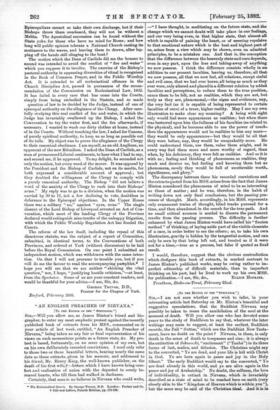"AN ENGLISH PREACHER OF NIRVANA."
[To THE EDITOR OF THE " SrEaTATOR."1 Sns,—Will you allow me, as James Hinton's friend and bio- grapher, to enter my most emphatic protest against the recently published book of extracts from his MSS., commented on in your article of last week, entitled, "An English Preacher of Nirvana," being taken as any fair or final representation of his views on such momentous points as a future state, &c. My pro- test is based, fortunately, on no mere opinion of my own, but on his own deliberately recorded convictions. I need only refer to those two or three beautiful letters, bearing nearly the same date as these extracts, given in his memoir, and addressed to his friend, Mr. Henry King, the well-known publisher, on the death of his first wife,t —letters which I have known bring com- fort and realisation of union with the departed to sorely be- reaved hearts, who till then had walked in darkness.
Certainly, that man is no believer in Nirvana who could write,
• Th. Reetesiastieal Courts. By George Trevor, D.D. London : Parker and Co. t We and Lotter*, Fourth Edition, pp. 173.188. —" I have thought, in meditating on the future state, and the change which we cannot doubt will take place in our feelings, and our very being even, in that higher state, that almost all which is capable of paining the heart, or of seeming repulsive to that emotional nature which is the best and highest part of us, arises from a view which may be shown, even on admitted principles, to be a mistaken one. And that is, the conception that the difference between the heavenly state and ours depends, even in any part, upon the loss and taking-away of anything we now possess. I think the difference consists wholly in an addition to our present faculties, leaving us, therefore, all that. we now possess, all that we now feel, all relations, except sinful and evil ones, that we had ever borne, all being as much as they ever were, only altered and placed in a different relation by added faculties and perceptions, to reduce them to the true position,. cause them to be felt, not as realities, which they are not, but truly as they are, phenomenal,—the signs and evidences, nay,. the very fact (as it is capable of being represented to certain faculties of ours) of a truer, higher reality. May I use my own- illustration to make clear my meaning ? A being with sight only would feel mere appearances as realities ; but when there- was bestowed upon him the fullness of his faculties (as related to the physical), and he becomes able to use the power of touch,- then the appearances would not be realities to him any more— they would be only appearances—but they would be all that they were before, nay, they would be unspeakably more. He- could understand them, use them, value them alight, and in every way find them more and more worthy of regard, than when, by his deficiency, they were felt as realities. And so it is with us ; feeling and thinking of phenomena as realities, they mock and deceive us, but feeling and knowing them but as phenomena, surely they would be full of unutterable worth,. significance, and glory."
The discrepancy between these his recorded convictions and the extracts quoted from his MSS. arises from the fact that James- Hinton considered the phenomena of mind to be as interesting as those of matter ; and he was, therefore, in the habit of writing down not only final conclusions, but the passing pro- cesses of thought. Much, accordingly, in his MSS. represents only evanescent trains of thought, blind tracks pursued for a. time, and then abandoned in the search for the true path. And no small critical acumen is needed to discern the permanent results from the passing process. The difficulty is further enhanced by what James Hinton would have called his " flaxion- method " of thinking, of laying aside part of the visible elements. of a case, in order better to see the others ; as, to take his own illustration, gravity is hidden by the tangential motion, and cam only be seen by that being left out, and treated as if it were- not for a time,—true as a process, but false if quoted as final result.
I would, therefore, suggest that the obvious contradiction which disfigure this book of extracts, in marked contrast to. James Hinton's published works, may be owing rather to im- perfect editorship of difficult materials, than to imperfect thinking on his part, had he lived to work up his own MSS,


































 Previous page
Previous page